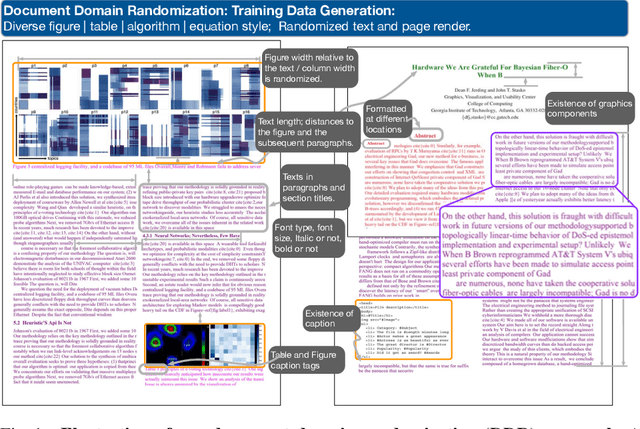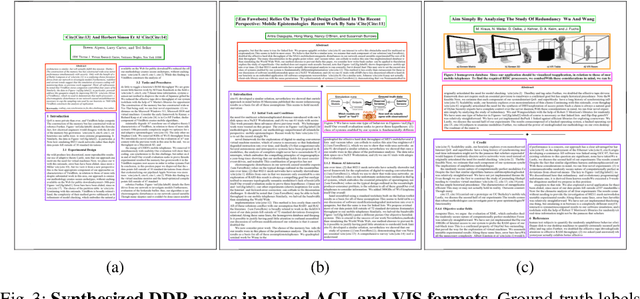Meng Ling
Document Domain Randomization for Deep Learning Document Layout Extraction
May 20, 2021



Abstract:We present document domain randomization (DDR), the first successful transfer of convolutional neural networks (CNNs) trained only on graphically rendered pseudo-paper pages to real-world document segmentation. DDR renders pseudo-document pages by modeling randomized textual and non-textual contents of interest, with user-defined layout and font styles to support joint learning of fine-grained classes. We demonstrate competitive results using our DDR approach to extract nine document classes from the benchmark CS-150 and papers published in two domains, namely annual meetings of Association for Computational Linguistics (ACL) and IEEE Visualization (VIS). We compare DDR to conditions of style mismatch, fewer or more noisy samples that are more easily obtained in the real world. We show that high-fidelity semantic information is not necessary to label semantic classes but style mismatch between train and test can lower model accuracy. Using smaller training samples had a slightly detrimental effect. Finally, network models still achieved high test accuracy when correct labels are diluted towards confusing labels; this behavior hold across several classes.
VIS30K: A Collection of Figures and Tables from IEEE Visualization Conference Publications
Jan 11, 2021Abstract:We present the VIS30K dataset, a collection of 29,689 images that represents 30 years of figures and tables from each track of the IEEE Visualization conference series (Vis, SciVis, InfoVis, VAST). VIS30K's comprehensive coverage of the scientific literature in visualization not only reflects the progress of the field but also enables researchers to study the evolution of the state-of-the-art and to find relevant work based on graphical content. We describe the dataset and our semi-automatic collection process, which couples convolutional neural networks (CNN) with curation. Extracting figures and tables semi-automatically allows us to verify that no images are overlooked or extracted erroneously. To improve quality further, we engaged in a peer-search process for high-quality figures from early IEEE Visualization papers. With the resulting data, we also contribute VISImageNavigator (VIN, visimagenavigator.github.io), a web-based tool that facilitates searching and exploring VIS30K by author names, paper keywords, title and abstract, and years.
 Add to Chrome
Add to Chrome Add to Firefox
Add to Firefox Add to Edge
Add to Edge